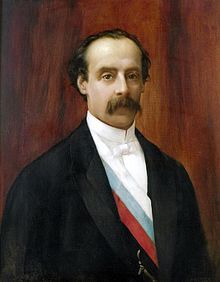José Manuel Balmaceda
| José Manuel Balmaceda | |
|---|---|
 |
|
| 11th President of Chile | |
|
In office September 18, 1886 – August 29, 1891 |
|
| Preceded by | Domingo Santa María |
| Succeeded by | Jorge Montt |
| Personal details | |
| Born |
July 19, 1840 Hacienda Bucalemu, Chile |
| Died | September 18, 1891 (aged 51) Santiago, Chile |
| Political party | Liberal |
| Spouse(s) | Emilia de Toro Herrera |
| Signature | |
José Manuel Emiliano Balmaceda Fernández (July 19, 1840 – September 18, 1891) was the 11th President of Chile from September 18, 1886 to August 29, 1891. Balmaceda was part of the Castilian-Basque aristocracy in Chile. While he was president, his political disagreements with the Chilean congress, led to the 1891 Chilean Civil War, at the end of which he shot and killed himself.
Balmaceda was born in Bucalemu, the eldest of the 12 children of Manuel José Balmaceda Ballesteros and Encarnación Fernández Salas. His parents were wealthy, and in his early days he was chiefly concerned in industrial and agricultural enterprises. In 1849, he attended the School of the French Friars, and considered joining the clergy, studying several years of theology at the Santiago Seminary.
In 1864 he became secretary to Manuel Montt, who was one of the representatives of the Chilean government at the general South American congress at Lima, and after his return obtained great distinction as an orator in the national assembly. In 1868 he joined forces with Justo and Domingo Arteaga Alemparte to found and publish the newspaper "La Libertad" (Freedom). He also was a constant contributor to the "Revista de Santiago", and published two monographs: "The political solution in electoral freedom" and "Church and State". In 1869 he joined the Club de la Reforma, which became the political basis of the Liberal Party. The essential tenets of the political program were freedom of religion, increased personal and political freedom, elimination of governmental intervention in the electoral process, reform of the 1833 constitution and restriction of the powers of the President.
On the basis of this radical program, he was elected Deputy for Carelmapu several times: 1864–1867; 1870–1873; 1873–1876; 1876–1879; 1879–1882. Under President Aníbal Pinto, he discharged some diplomatic missions abroad, and is credited with persuading Argentina not to join the War of the Pacific in 1878. In 1882 he was re-elected both for Carelmapu and Santiago. He decided to accept neither and became instead successively Minister of Foreign Affairs and Colonization and of the Interior under the presidency of Domingo Santa María. In the latter capacity he carried compulsory civil marriage and several other laws highly obnoxious to the conservatives and the clergy. Balmaceda was also elected a Senator for Coquimbo (1882–1888). He was proclaimed a candidate to the presidency on the Odeon Theater of Valparaíso on January 17, 1886, with the support of the Nacional, Liberal and part of the Radical Parties. On June 25 he was elected President as sole candidate.
...
Wikipedia
